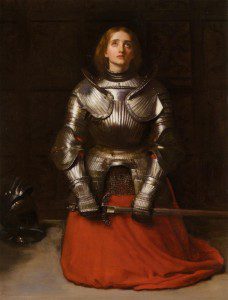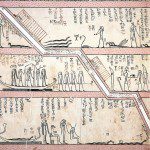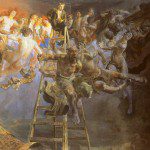 After the description of the ritual bath with the wine of imbas, the “Invocation” goes on to list the nine “graces” or virtues:
After the description of the ritual bath with the wine of imbas, the “Invocation” goes on to list the nine “graces” or virtues:
The grace of form,
The grace of voice,
The grace of fortune,
The grace of goodness,
The grace of wisdom,
The grace of charity,
The grace of choice maidenliness,
The grace of whole-souled loveliness,
The grace of goodly speech.
The word Carmichael translates as “form” is cruth, which Gaelic dictionary Am Faclair Beag defines as form, figure, shape, countenance, personal appearance or facial expression.
The word Carmichael translates as “voice” is guth, which Am Faclair Beag defines as either the voice or a word or the mention of a thing.
The word Carmichael translates as “fortune” is rath, which Am Faclair Beag defines as “good fortune.”
The word Carmichael translates as “goodness”is math, which Am Faclair Beag defines as goodness, profit, advantage or prosperity.
The word Carmichael translates as “wisdom” is cnoc, which Am Faclair Beag defines as “hill.” However, the Gaelic dictionary at Glosbe.com notes that cnoc can also mean wisdom as Carmichael says. This may be a reference to the Gaelic belief that special skills or excellences such as the buaidh derived from the power of the dead or the fairies in their hollow hills. Gaelic scholar Michael Newton describes this concept in detail in his essay Bha mi ‘s a chnoc: Creativity in Scottish Gaelic Tradition, in which the phrase bha mi ‘s a chnoc literally means “I was in the hill”.
The word Carmichael translates as “charity” is bochd, which Am Faclair Beag defines as poverty, difficulty or illness. It isn’t easy to see how this could qualify as a buadh, as the word has no positive connotations in Gaelic. Carmichael might have assumed that the word must originally have been something else, but my guess would be that buaidh bochd is supposed to mean “victory over poverty.”
The phrase Carmichael translates as “choice maidenliness” is rogha finne. According to Am Faclair Beag, the word rogha means “the best of” or “the choice of” and finne means a maiden, a beautiful woman, whiteness or fairness. So the phrase could be expressed as “choice womanhood”.
The phrase Carmichael translates as “whole-souled loveliness” is fior eireachdais. According to Am Faclair Beag, the word fior means true, genuine or pure and eireachdais means beauty or handsomeness. Fior can also mean “fire.”
The phrase Carmichael translates as “goodly speech” is deagh labhraidh. According to Am Faclair Beag, the word deagh means “good” and labhraidh means “diction.”
At first glance, this list might seem a lot more appropriate for a young woman than a young man, as the graces in question would be seen in our culture as entirely feminine: a beautiful face and figure, a charming voice, true elegance even in poverty. However, young Highlanders of the warrior class were expected to display a graceful, elegant bearing. The sons of clan chieftains studied dancing and swordsmanship at the same schools, so grace and beauty were not necessarily seen as being un-masculine.
Another clue that this list of nine graces is not merely intended to make the recipient a socially acceptable young lady is that the very next verse is about achieving complete domination over all your enemies:
Dark is yonder town,
Dark are those therein,
Thou art the brown swan,
Going in among them.
Their hearts are under thy control,
Their tongues are beneath thy sole,
Nor will they ever utter a word
To give thee offense.
According to Carmichael, “brown swan” is a Gaelic euphemism for a young girl, with “white swan” indicating an older one. Another prayer in the Carmina Gadelica uses very similar imagery to pray for justice:
God, I am bathing my face
In the nine rays of the sun,
As Mary bathed her Son
In generous milk fermented.Sweetness be in my face,
Riches be in my countenance,
Comb-honey be in my tongue,
My breath as the incense.Black is yonder house,
Blacker men therein;
I am the white swan,
Queen over them.I will go in the name of God,
In likeness of deer, in likeness of horse,
In likeness of serpent, in likeness of king,
More victorious am I than all persons.
Although this prayer for justice mentions Mary rather than Brighid, the imagery of bathing in sunlight and milk connects it to Brighid and to the “Invocation of the Graces.” The power of the “Invocation of the Graces” to grant victory over one’s enemies should not be seen as something given in addition to the feminine charms listed in the first verse, but because of them. The word buaidh, after all, means “victory.”
When Brighid bathes your palms and cheeks in Her “lustral fire,” in Her milk and sunlight, in Her honey and wine, She not only grants you Her beauty and elegance but makes you “more victorious than all persons.”
Loop of Brighid is published on alternate Thursdays. Follow it via RSS or e-mail!

















